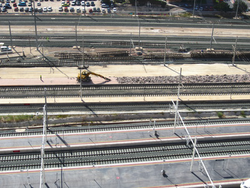
Jan. 10, 2015
Sectorial Analysis

As soon as Regulation assumes independence of the operator who manages the essential infrastructure, ex ante conditions of such independence must be met.
Europe doesn't require legal autonomy of the essential infrastructure manager, probably because such autonomy, it would be both too ask the Policy, which may want more integrated organizations as soon as public transportation is a mix of public policies and that to public funds are used. But it would also be too little to ask the Policy because no matter the legal autonomy, the key is the real independence of the manager, that is under the control of the Regulator.
In France, the regulatory body is the Autorité de Régulation des Activités Ferroviaires (French Regulatory Authority of Railways Activities).
The Loi portant réforme ferroviaire (Railway Reform Act) of August 4, 2014 has made the integration of the company that manages the rail network, which the new name is SNCF Réseau (SNCF Network) in a public group, which also includes the SNCF, public transportation operator, in competition with new entrants in a newly opened sector to competition.
The Competition Authority in its opinion of 4 October 2013 had expressed reluctance towards the bill, to the influence that such corporate organization offers to the public operator, to the detriment of its competitors and the opening of the railway sector to competition.
The critical tone increases with the Opinion of 6 January 2015 relatif à des projets de décrets pris pour l'application de la loi portant réforme ferroviaire (on draft orders made for the purposes of Railwayl Reform Law).
The Competition Authority issues its opinion as a real essay on what should be the Regulation of the railway sector through the "governance" of the network manager. Indeed, the first part of the opinion relates to "the independent management of railway infrastructure" while the second focuses on the integration of railway network in the public group built par the law. The third part of this Opinion draws conclusions to measure whether we can consider that the Autorité de Régulation des Activités Ferroviaires (French Regulatory Authority of Railways Activities) shall have the capacity to ensure this independence by governance or not.
This review, in its construction itself, demonstrates the dialectic between Regulation and Governance (I), which is an observation and stresses the role of the regulator in the effectiveness of governance (II), which is more a question .

